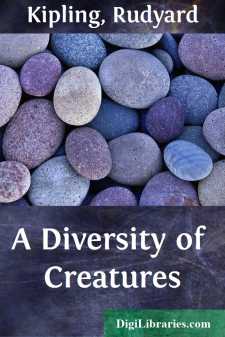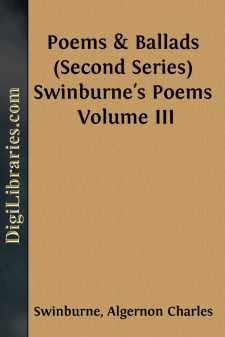Poetry
- American 96
- Ancient, Classical & Medieval 41
- Asian 15
- Australian & Oceanian 11
- Canadian 11
- Caribbean & Latin American 5
- Children's Poetry & Nursery rhymes 51
- Continental European 11
- English, Irish, Scottish, Welsh
- General 483
- Inspirational & Religious 7
- Middle Eastern 3
English, Irish, Scottish, Welsh Books
Sort by:
by:
Rudyard Kipling
As Easy as A.B.C. (1912) The A.B.C., that semi-elected, semi-nominated body of a few score persons, controls the Planet. Transportation is Civilisation, our motto runs. Theoretically we do what we please, so long as we do not interfere with the trafficand all it implies.Practically, the A.B.C. confirms or annuls all international arrangements, and, to judge from its last report, finds our tolerant,...
more...
BALLADE OF THE PRIMITIVE JEST "What did the dark-haired Iberian laugh at before the tall blondeAryan drove him into the corners of Europe?"—Brander Matthews I am an ancient Jest!Palaeolithic manIn his arboreal nestThe sparks of fun would fan;My outline did he plan,And laughed like one possessed,'Twas thus my course began,I am a Merry Jest! I am an early Jest!Man delved, and built, and...
more...
POEMS OF NATURE The world is too much with us; late and soon,Getting and spending, we lay waste our powers:Little we see in Nature that is ours;We have given our hearts away, a sordid boon!This sea that bares her bosom to the moon,The winds that will be howling at all hours,And are up-gathered now like sleeping flowers;For this, for everything, we are out of tune;It moves us not.—Great God! I'd...
more...
THE LAST ORACLE (A.D. 361)Years have risen and fallen in darkness or in twilight, Ages waxed and waned that knew not thee nor thine,While the world sought light by night and sought not thy light, Since the sad last pilgrim left thy dark mid shrine.Dark the shrine and dumb the fount of song thence welling, Save for words more sad than tears of blood, that said: Tell the king, on earth has...
more...
by:
James Joyce
I Strings in the earth and airMake music sweet;Strings by the river whereThe willows meet. There's music along the riverFor Love wanders there,Pale flowers on his mantle,Dark leaves on his hair. All softly playing,With head to the music bent,And fingers strayingUpon an instrument. The twilight turns from amethystTo deep and deeper blue,The lamp fills with a pale green glowThe trees of the avenue....
more...
by:
Samuel Rogers
ANALYSIS OF THE FIRST PART. THE Poem begins with the description of an obscure village, and of the pleasing melancholy which it excites on being revisited after a long absence. This mixed sensation is an effect of the Memory. From an effect we naturally ascend to the cause; and the subject proposed is then unfolded with an investigation of the nature and leading principles of this faculty. It is...
more...
PREFACE. A Ninth Edition of the following Poems having been called for by the public, the author is induced to say a few words, particularly concerning those which, under the name of Sonnets, describe his personal feelings. They can be considered in no other light than as exhibiting occasional reflections which naturally arose in his mind, chiefly during various excursions, undertaken to relieve, at...
more...
by:
Various
WITH PIPE AND BOOK. With Pipe and Book at close of day, Oh, what is sweeter, mortal, say? It matters not what book on knee, Old Izaak or the Odyssey, It matters not meerschaum or clay. And though one's eyes will dream astray, And lips forget to sue or sway, It is "enough to merely be," With Pipe and Book. What though our modern skies be gray, As bards aver, I will not pray For...
more...
by:
John Jenkins
INTRODUCTION. The literature of a people always reflects their character. You may discover in the prose and poetry of a nation its social condition, and in their different phases its political progress. The age of Homer was the heroic, in which the Greeks excelled in martial exploits; that of Virgil found the Romans an intellectual and gallant race; the genius of Chaucer, Spencer and Sidney...
more...
by:
Various
PREFACE This book of verse for boys is, I believe, the first of its kind in English. Plainly, it were labour lost to go gleaning where so many experts have gone harvesting; and for what is rarest and best in English Poetry the world must turn, as heretofore, to the several ‘Golden Treasuries’ of Professor Palgrave and Mr. Coventry Patmore, and to the excellent ‘Poets' Walk’ of Mr. Mowbray...
more...











